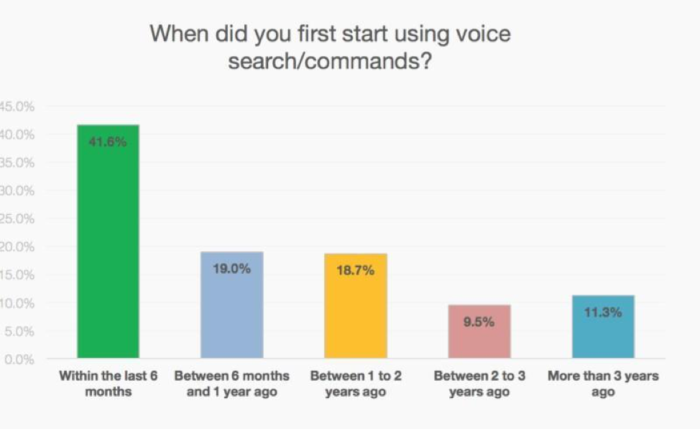In today’s world, optimizing your website to only get views is not enough. You must optimize for audio search as well. Voice-activated searches are growing in popularity all the time, and missing out on audio search consumers would be a mistake. Here’s how to make sure you can reach those who use audio search tools.
Audio Search Is On The Rise
Google’s CEO shared in 2016 that roughly 20% of its search are voice searches. In fact, it’s predicted that by 2020 50% of all US searches will be audio search derived.
This graph from Search Engine Land shows just how pervasive the rise of voice searching is.
This will make having your pages be optimized for audio search a necessity. Many people who use mobile devices opt for audio search. In fact, digital voice-activated assistants are more popular than ever both on mobile devices and in the home.
Many people use digital assistants like Alexa, Siri, Google Home, and Cortana.
What Makes Voice Search Different
When people type text, they often use as few words as possible for the sake of convenience. For example, someone who is wondering about the average temperature in Tokyo, Japan in the spring might be likely to type in “Spring Temperature Tokyo.”
They will be likely to use direct keywords. However, people do not speak in direct keywords.
However, people interact with voice-activated apps and digital assistants differently than they do with text-based search engines. While people often type in direct keywords, people interact with their digital assistants in a far more natural and conversational way.
Someone who would type in “Spring Temperature Tokyo” would be more likely to voice a query like “What is the weather like in Tokyo in the spring?” This often makes voice searches a lot longer.
SEE ALSO: Digital Brand Visibility: How Voice Search Changes Everything
Wording Is Everything
People even structure their voice searches differently depending upon their intentions. People looking to take action make purchases often ask more specific and targeted questions. They are more likely to ask questions regarding price and where things are available than those who are just generally curious or doing research.
How To Optimize Your Site For Audio Search
Audio search is rising in importance and will be more important for overall outreach than ever before in the future. So, how do you make sure that your website is ready to take on this change and stay relevant?
Speed Optimization
Speed is important for all searches, but even more so for audio searches. This is because people making use of voice search are often doing it mobility and might not be connected to broadband fiber networks.
They want websites that load quickly and deliver immediate results, regardless of where they are. If a page seems to be struggling to load on a mobile device, most people will simply drop it an move onto the next.
Check your page’s load speed and improve it if necessary. This can have large effects on your overall ranking.
HTTPS Protocol
One solid SEO practice to consider for both mobile and desktop is the implementation of HTTPS protocol. This indicates that your website is certified with Secure Sockets Layer (SSL).
This will make your site look more trustworthy in the eyes of search engines and cause them to favor your website.
The Importance of Short-form Content
When it comes to audio search optimization, short-form content can be particularly effective. In audio search, people are more likely to structure their queries as actual questions. Since they are asking questions, they expect accessible and correct answers.
If you manage to provide such facts in an efficient way, your content could possibly even qualify for Google’s feature snippets. These are known as position zero as they are summaries that pop up immediately under a search query and are read aloud to the voice search user.
Don’t Discount Long-form Content
While short-term content has its benefits, don’t forget about long-form content. An article’s length actually directly impacts its position in search engine rankings. Longer articles are often more visible than shorter articles for several reasons.
- They contain more information
- They have a high concentration of diverse keywords
- Their keywords trigger more responses in searches
- They have more outbound links
Outbound links may inspire those cited in articles to share them with their own social media followings. This amplifies the reach of content and its increased reach makes Google think that it is more valuable for searchers.
SEE ALSO: It’s Time to Take the Brand Out of Branded Content
Include Audio Files
Consider integrating audio files into your content, whether it is long-form or short-form. Including sound bites and even podcasts of the text can be useful.

Mobile audio searchers likely don’t have the time to read an entire long-form article. However, they will be more likely to listen to the audio version of an article as they drive or travel from place to place.
Questions Vs. Keywords
People typing into search bars often use keywords, but those using audio search generally ask questions. Think about your audience and structure your answers accordingly.
Make sure your content answers questions directly in a way that is simple to understand. Use short sentences and break up your text so it doesn’t appear to mobile users in intimidating chunks that are a pain to scroll through.
Remember that most people scan, rather than fully reading web content.
A Thoughtful FAQ
FAQ (Frequently Asked Question) pages are key to optimizing for audio search. Include general questions related to your niche and give short but straightforward answers to them.
Depending on which niches your site appeals to, you may even want to divide your questions by target audience to make it even easier for searchers to find exactly the information they need.
Get Visual
There are countless websites out there. If your website does not look good, it will fail to draw the traffic you want. Your website must not only look good on computers or laptops. It must also be optimized to look just as good on mobile devices. Your website must be designed responsively.
Check how it displays on several types of mobile devices and makes changes accordingly. Even simply changing the typography to make it more readable on mobile devices can have a huge impact.
SEE ALSO: 10 Graphic Design Rules You Should Never Break
The Audio Revolution Is Here
As technology evolves so does user behavior. Audio searches will only become more common as the ways consumers interact with the changing world of tech grows and shifts. Don’t forget about the ears of those using voice search as you update and expand your web presence.
How often do you make audio searches? Comment below…












